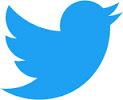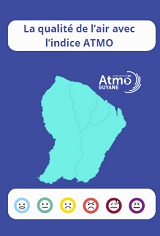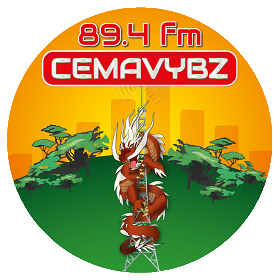Blada.com
samedi 21 février
Boîtes aux lettres
Courrier des lecteurs
Petites annonces
Emploi / Formation
Covoiturage
Infos citoyennes
Infos citoyennes
10/08/20
Comment YanaCov casse les chaînes de transmission
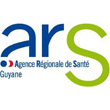 En se rendant au domicile des personnes testées positives au Covid-19 dans l’Île-de-Cayenne, les équipes du dispositif les aident à organiser leur isolement du reste de la famille, proposent le test à leur entourage, leur fournissent masques, savons et gels hydro-alcooliques, les orientent vers les structures pouvant leur apporter un soutien pour la vie de tous les jours, et rappellent les gestes barrières… Un dispositif inspiré de Covisan, développé par l'AP-HP en Région parisienne.
En se rendant au domicile des personnes testées positives au Covid-19 dans l’Île-de-Cayenne, les équipes du dispositif les aident à organiser leur isolement du reste de la famille, proposent le test à leur entourage, leur fournissent masques, savons et gels hydro-alcooliques, les orientent vers les structures pouvant leur apporter un soutien pour la vie de tous les jours, et rappellent les gestes barrières… Un dispositif inspiré de Covisan, développé par l'AP-HP en Région parisienne.
Il est 9 heures, ce vendredi matin, quand Camille Bouvet, infirmière à l’Apajh, Mylène Lalanne et Leïla Supplice, étudiante en deuxième et troisième années à l’Institut de formation en soins infirmiers (Ifsi), se présente à l’entrée d’un squat au Larivot. Une maman de 22 ans a été testée positive au Covid-19, trois jours plus tôt aux urgences. Elle ne présente aucun symptôme mais a accepté qu’une équipe de YanaCov viennent l’aider à s’isoler.
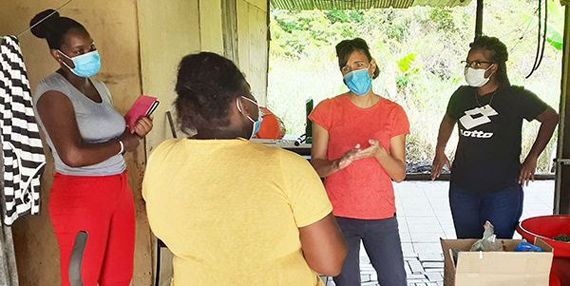
L’isolement sera difficile à mettre en œuvre, dans cette sorte de grande maison où cinq chambres, occupées par autant de famille, sont disposées autour d’une terrasse commune. La patiente vit dans l’une d’elle, avec son compagnon et leurs deux enfants d’un et deux ans. S’isoler dans un établissement dédié en alternative au domicile, elle refuse à cause de ses deux bambins, quand bien même les structures acceptent d’accueillir les malades avec leurs enfants. « Quand les patients n’ont pas de symptômes, il est plus difficile de les convaincre », constate-t-on à l’Apajh.
Les patients en grande précarité sont généralement orientés vers les associations comme la Croix-Rouge. Le dispositif YanaCov, conçu par l’ARS et l’Apajh, avec le soutien de l’Assistance publique – Hôpitaux de Paris (AP-HP), vise à tester, tracer, isoler, accompagner et protéger des patients qui ne sont pas accompagnés par les associations et n’ont pas les moyens d’organiser seuls leur isolement. Il se concentre pour l’heure à l’Île-de-Cayenne.
L’équipe YanaCov est arrivée avec un kit sanitaire : une boîte de masques pour toute la famille, du savon et du gel hydro-alcoolique. « En fonction des informations que nous transmet le médecin, on part aussi avec des kits alimentaires. » Ce jour-là, la patiente indique avoir « de la nourriture pour une semaine ». L’équipe repartira avec son carton de conserves fournis par l’épicerie solidaire Ti Dégra. « Pour cette famille, nous allons faire un signalement à la Croix-Rouge et au centre communal d’action sociale de Matoury. Dans un cas comme celui-ci, le coronavirus n’est pas le seul problème. Le point positif, c’est que quand nous sommes arrivés, tout le monde portait le masque », souligne Camille Bouvet.
« Je ne sors pas pour le plaisir », assure la patiente. Ce matin-là, son compagnon est parti chercher du gaz. Appelé sur son portable par l’équipe YanaCov, il dit ne pas être intéressé par un dépistage. Lui non plus n’a pas de symptômes, pas plus que les enfants. Mais le risque de transmission est réel. « Quand nous avons appelé la première fois, c’est un voisin qui a répondu avec le portable de la patiente », se souvient Camille Bouvet.
Alors avec ses collègues, elle rappelle les gestes barrières : le port du masque, le lavage des mains. « Pour les repas, il faudrait manger seule, quand les autres ont quitté la table. Quand vous touchez des meubles, il faut nettoyer après. » L’équipe a encore quelques conseils à fournir. Au moment de partir, elle laisse une affiche à la patiente : « Dessus, il y a le numéro pour nous contacter. Nous vous appellerons tous les trois jours, pour savoir comment ça va. »
Plus de deux cents personnes accompagnées en quinze jours
Depuis le lancement du dispositif il y quinze jours, quarante-cinq patients et leur entourage, soit environ 210 personnes, sont suivis par YanaCov, dans l’Île-de-Cayenne. Certains ont été orientés vers YanaCov par leur médecin traitant. D’autres par l’unité des maladies infectieuses (Umit) du centre hospitalier de Cayenne. Les équipes du dispositif peuvent alors intervenir auprès des proches du patient avant son retour à domicile. Elles sont également présentes sur certains drives. Vendredi matin, elles proposaient un suivi par YanaCov aux personnes qui se sont présentés à l’opération de dépistage organisée au marché de Cayenne. « Nous rappellerons celles qui sont positives et toutes les personnes symptomatiques », explique Marion Béranger, qui coordonne le dispositif à l’Apajh avec Priscia Monjo.
Le Dr Philippe Abboud, de l’Umit, est médecin référent pour YanaCov. « Je m’assure que le patient a bien reçu son résultat et que son médecin traitant l’a également reçu. Je vérifie qu’il y a effectivement un suivi. On ne se contente pas des déclarations du patient. S’il n’a pas de médecin traitant, je peux le basculer sur Véyé mo santé. Et si vraiment il n’y a pas de solution, je fais le médecin balai et je suis le patient par téléphone. »
By going to the homes of people who test positive for Covid-19 in Cayenne, the teams of the device help them organize their isolation from the rest of the family, offer the test to those around them, provide them with masks, soaps and hydro-alcoholic gels, guide them towards structures that can provide them with support for everyday life, and remind them of barrier gestures… A device inspired by Covisan, developed by the AP-HP in the Paris region.
It is 9 a.m. this Friday morning, when Camille Bouvet, nurse at Apajh, Mylène Lalanne and Leïla Supplice, second and third year student at the Nursing Training Institute (Ifsi), shows up at the entrance a squat at Larivot. A 22-year-old mother tested positive for Covid-19 three days earlier in the emergency room. She has no symptoms but has agreed to have a YanaCov team come to help isolate herself.
Isolation will be difficult to achieve in this sort of large house where five bedrooms, occupied by as many families, are arranged around a common terrace. The patient lives in one, with her partner and their two children, one and two years old. Isolate herself in a dedicated establishment as an alternative to home, she refuses because of her two toddlers, even though the structures accept to welcome the sick with their children. "When patients do not have symptoms, it is more difficult to convince them," we can see from Apajh.
Patients in great precariousness are generally referred to associations such as the Red Cross. The YanaCov device, designed by ARS and Apajh, with the support of Public Assistance - Hospitals of Paris (AP-HP), aims to test, trace, isolate, support and protect patients who are not accompanied by associations and do not have the means to organize their isolation on their own. He is concentrating for the moment in Cayenne.
The YanaCov team arrived with a sanitary kit: a box of masks for the whole family, soap and hydro-alcoholic gel. “Depending on the information we receive from the doctor, we also leave with food kits. That day, the patient said she had food for a week. " The team will leave with their box of canned goods provided by the solidarity grocery store Ti Dégra. “For this family, we will report to the Red Cross and to the Matoury communal social action center. In a case like this, the coronavirus is not the only problem. The positive point is that when we arrived, everyone was wearing a mask, "said Camille Bouvet.
“I don't go out for fun,” says the patient. That morning, his companion left for gas. Called on his cell phone by the YanaCov team, he says he's not interested in being tested. He also has no symptoms, and neither do the children. But the risk of transmission is real. "When we called the first time, a neighbor answered with the patient's cell phone," recalls Camille Bouvet.
So with her colleagues, she recalls the barrier gestures: wearing a mask, washing hands. “For meals, you should eat alone, when the others have left the table. When you touch furniture, you have to clean up afterwards." The team still have some advice. When leaving, she leaves a poster with the patient: “Above, there is the number to contact us. We'll call you every three days to find out how you're doing. "
More than two hundred people accompanied in two weeks
Since the device was launched a fortnight ago, forty-five patients and their families, or around 210 people, have been followed by YanaCov, in Cayenne Island. Some were referred to YanaCov by their attending physician. Others by the Infectious Diseases Unit (Umit) of the Cayenne Hospital Center. The teams of the device can then intervene with the relatives of the patient before his return home. They are also present on some drives. On Friday morning, they offered follow-up by YanaCov to people who presented for the screening operation organized at the Cayenne market. "We will call back those who are positive and all those who are symptomatic," explains Marion Béranger, who coordinates the program at Apajh with Priscia Monjo.
Dr Philippe Abboud, from Umit, is a referring physician for YanaCov. "I make sure that the patient has received his result and that his attending physician has received it as well. I check that there is indeed a follow-up. We are not satisfied with the statements of the patient. If he doesn't have an attending physician, I can switch him to Véyé mo santé. And if there really is no solution, I do the doctor sweep and I follow the patient over the phone. "
Raccourcis
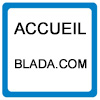
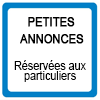
passer une petite annonce
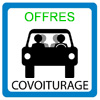
passer une annonce de covoiturage
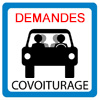
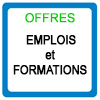
passer une annonce d’emploi
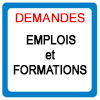
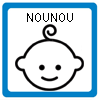
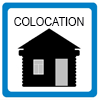
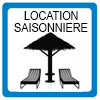
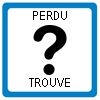
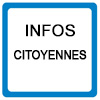
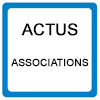
associations, postez vos actualités
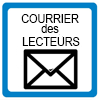
participez au courrier des lecteurs
La Guyane c’est ici
La qualité de l’Air avec
ATMO
Photothèque

Lancements 2022
Vol 259 Ariane 5


